#Chinese entrepreneur
Explore tagged Tumblr posts
Link
Zhong Huijuan is a 59-year-old Chinese entrepreneur who started a pharmaceutical company empty-handed. Currently, she has been named the world’s richest self-made women billionaire with 106 billion yuan (about $15.1 billion). Although she was unknown to several business individuals or personalities, she has currently become the talk of the town. Today, Zhong Huijuan is popular as Asia’s richest woman.
#Zhong Huijuan#Chinese entrepreneur#self-made billionaire#Asia’s richest woman#pharmaceutical company#world’s richest self-made women
0 notes
Photo

Nathan Fong (deceased)
Gender: Male
Sexuality: Gay
DOB: 16 March 1959
RIP: 30 March 2020
Ethnicity: Chinese
Nationality: Canadian
Occupation: Chef, activist, reality star, entrepreneur
Note: Had HIV but died with unrelated causes
#Nathan Fong#lgbt history#qpoc#bipoc#lgbtq#male#gay#1959#rip#historical#asian#poc#chinese#canadian#chef#activist#Reality Star#entrepreneur#hiv
83 notes
·
View notes
Text


I made a little editorial for the guy I’m dating. I graduate from university in two semesters. I might teach English in China to get 我的水平 up to par. Can’t work at the neighborhood pizza place forever.


中文: he began having an interest in furniture during high school. Since then, his name is now well known. He enjoys using various styles.
français: “it’s an art, really” he assures me on the subject of making furniture. he recounts these things with such passion and pride, it’s hard for me not to blush.


here the chinese words for life and opportunity accompany a quote i heard on one of those detective shows like ncis la and i liked it.
photo is southern indiana.
merci xx
赵酷峰 k y l e
#graphic design#design#amateur artist#editorial#furniture#interior design#entrepreneur#ceo#indiana#chinese langblr#langblr#french langblr#lds church#mormon#photography#travel#summer
3 notes
·
View notes
Text
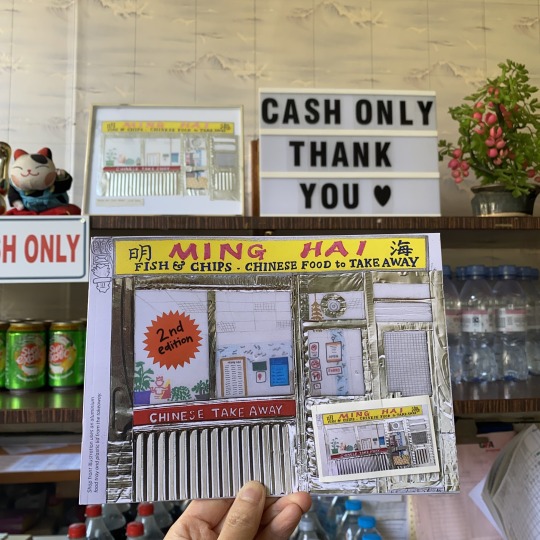

明 Ming Hai 海 Zine - design, research, text & illustration
Ming Hai is a 34 year old Chinese takeaway in Hackney, London UK, run by the Chan family. All the family members contributed stories or illustrations and photos from the archives about what it is like to live and work in a Chinese takeaway, whether as an immigrant or a second-generation takeaway kid. This zine is a love letter to the takeaway and to takeaway kids worldwide. After the amazing response to the first edition and running low on zines, I decided to do a second edition but instead of a straight reprint, this edition comes with additional content and a sticker. An independent published zine by kamipaper. • A5 Landscape • English and a tiny bit of Cantonese • 24 pages full colour • 200-250gsm recycled card cover • 100gsm recycled paper • Shop front sticker
Special thanks to: - Lauren Siobhan - Vivien Chan - Rio Cinema Archives - Isola Press - Alan Denney
Available at: • Migration Museum - Lewisham, London UK • Museum of the Home - Hoxton, London UK • Housmans Bookshop - Kings Cross, London UK • Burley Fisher Books - Haggerston, London UK • Books - Peckham, London UK • Migration Museum - Lewisham, London UK • Hackney Chinese Community Services - Hackney, London UK • The Steamroom - Haggerston, London UK • Pushkin House - Bloomsbury, London UK • South London Gallery - Peckham, London UK • Ming Hai Takeaway - Hackney, London UK • Newbridge Projects - Newcastle upon Tyne, UK • Wing On Wo & Co - New York, USA • kamipaper Etsy Shop - Worldwide
May 2023
#明 Ming Hai 海#明海#ming hai#ming hai takeaway#chinese takeaway kid#chinese takeaway#takeaway kid#second generation#immigrant entrepreneur#hackney history#asian diaspora#diy zine#zine#self publishing#esea creative#east london#ming hai zine#kamipaper
4 notes
·
View notes
Text

This Durga Ashtami, let YOYO Chopsticks add a touch of Indo-Chinese spice to your festive celebrations! Indulge in our flavorful fusion of Chinese and Indian cuisines, perfect for the season. As the best Chinese food franchise in India, YOYO Chopsticks offers a delicious menu that brings people together. Whether you're dining with family or friends, our unique flavors are sure to make your celebrations even more memorable. Join the festive spirit with YOYO Chopsticks and enjoy a culinary journey like no other!
#chinese food franchise#franchise#yoyo chopsticks#chopsticks#yoyo#best chinese food franchise in india#retail cafe model#entrepreneur#cloud kitchen model#business#chinese fast food franchise
0 notes
Text
The Duality of Qi Ye: Unveiling the Profound Meaning Behind the Chinese Translation of "Enterprise"
In the fast-paced world of business, where buzzwords and jargon often dominate the landscape, it’s easy to overlook the deeper meanings behind the words we use every day. As someone who has been working for nearly two decades and has run a company for over ten years, I find myself constantly using the term “enterprise” or “company,” which translates to “qi ye” in Chinese. However, it wasn’t until…
0 notes
Text
An Overview Of Chinese Companies In India - Nishant Verma
In recent years, India has witnessed a significant increase in Chinese investments and business activities. Chinese companies have expanded their presence across various sectors in India, including manufacturing, technology, infrastructure, and e-commerce. This growing presence has had a substantial impact on the Indian economy and society, both positive and negative.
To Read more about Chinese companies in India Visit Nishant Verma website.

#entrepreneur#motivational speaker#nishant verma#grow with nishant verma#motivational#leadership#mentorship#nishantverma#Chinese Companies
0 notes
Text
Small Talk with Shirley
The Tea House
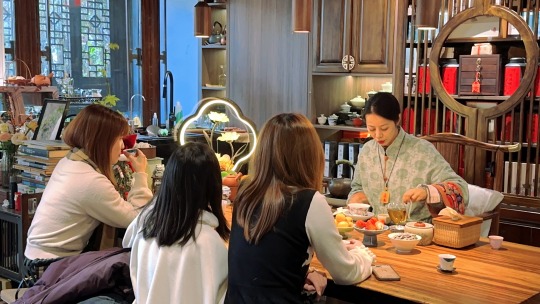
Cold. The January weather is bitter with ice. It bites the shins of those who forget to wear long socks, like a dog’s jagged teeth inching into bare skin, and tendrils into the warmth of the human heart. It is afternoon, and the winter sun is mellow in its pale, yellowed gaze. The aged gray stones whisper, and the wooden beams of the old Suzhou-style architecture shift in their cold, unforgiving slumber. The little town is quiet, but not desolate. An ember of warmth flickers in each templed storefront and—there it is. A rectangle of verdure enclosing low metal tables and chairs, Chinese charms of all kinds decorating the edges, flowers scattered arbitrarily across the floor, as if done by a giant’s hand. There is an infinite sequence of succulents on an elongated windowsill to the right, and a closed, glass door standing next to it. If you open the glass door, it will reveal an ancient world, a world you have never known—a world spanning more than five thousand years. Boxes of tea are stacked on every wall, their names written in thick, looping strokes of Chinese characters, ceramics of the deepest blues and brightest reds placed upside down on a table. Banners of calligraphy are framed on the walls, an unfolded fan with a painted tiger propped up by the tea sets. The owner will welcome you in; she is dressed in traditional Chinese dress—dyed a lovely turquoise—and her hair is carefully bound. A plaque hangs from a string around her neck. Her name is Shirley.
Shirley’s long, elegant fingers wrap around the handle of a china tea-pot. She pours tea for Claire. White smoke trails from Claire’s delicate cup. Shirley describes what tea it is, and how long it has been grown for. She points out the clearness of the color; how its redness is undiluted, as clean as a morning-lake. Claire sips her tea and closes her eyes, letting the flavor soak on her tongue. She opens.
Claire: You’re so good at all this tea stuff, Shirley. Did you always want to do something related to tea, or is it more of a spontaneous thing? It’s so interesting.
Shirley: I’ve been learning about tea for eleven years. At first—and this is going to sound surprising—I was an aerospace engineering major in university. I studied planes. I got a job during university—with a lot of luck—at an airport, where I was in charge of helping out customers with luxury goods. In the process, I learnt an incredible amount about tea, because it was an aspect the customers would never ignore when they sat in lounges and purchased goods. That’s when I initially got interested in tea culture, actually. After my job ended, I went back to my university professor and asked her for help. She helped me contact a tea master, and I quickly got involved. Funnily enough, I made my first income from tea this way—I asked around my school if anyone was interested in learning tea, had those people pay me a lesson fee, and, shortly after, listened to my tea master lecture to a whole class. I didn’t get to keep most of the money, of course, as it went to funding my tea master’s tuition, but I got to listen to my tea master’s class for free, as well as make a little extra. But I learnt to love tea, and all the complicated processes which preceded and followed it. I contacted more and more tea masters to learn tea. Eventually, even my provincial government contacted me to spread tea culture in my city—I got my university professor teacher to join in—and I opened several tea houses in the area. Now, my university professor operates them; she’s no longer an aerospace engineering teacher. I’m currently trying to maintain and spread tea culture in Suzhou—I opened a tea house on Xietang Road during the pandemic, and I’ve really grown to see a lot more tea houses on the street since then. I can’t take full credit, but I’d like to think that I’ve contributed to this growth in my own way.
Claire: Wow—that’s incredible. You really transitioned across two entirely different majors. And you’ve come so far, too! What do you think was the main reason why you were able to pursue tea as a career path? I mean, it’s hard to envision as a high-school student, especially since Chinese culture tends more towards traditional pathways such as STEM.
Shirley: I think my family definitely influenced me. My grandmother made porcelain, for instance, though she isn’t very famous. Her mentor is, though! And my parents were very supportive of my pursuing tea—they were skeptical at first, but supportive. I’ve tried to not rely on them for any monetary support, but they’ve provided a little. Also, the people you meet are truly valuable. I’ve met such a large variety of people interested in Chinese culture, and not just tea culture, because when you learn tea, you start learning about many other things, too. There’s calligraphy—tea needs decoration—and porcelain, obviously, but also Chinese paintings, jewelry, and Chinese medicine. There are so many threads interconnected with tea, it never gets boring. There’s always more to explore, and more to improve, and that’s why I was able to fully explore tea as a career path. Because tea isn’t really just tea. In my Suzhou tea house, for instance, I’ve witnessed people use tea as a vehicle for countless things—business deals, family talks, relaxation, amicable meetings between friends. Tea is also a vehicle for health; I’ve learnt a little about Chinese medicine, and I can thus prescribe different types of tea for complementary medical treatments. So, I suppose there’s two main reasons which allowed me to pursue tea as a career: my family, and the people I’ve met along the way, who have redefined what I thought was just ‘tea.’ You see, if tea had really just been mixing tea leaves into water, then I’d have given it up a long time ago. It’s the people—the people who help you get into tea, and pursue it, and also the people who come and drink it.
Shirley mixes another type of tea in her little pot by transferring boiling water from her kettle and pouring it in. She presents the new tea to Claire, letting her inhale the invigorating scent. Claire thinks it’s a little like grasslands garlanded by the bright, blinding afternoon light. A little like the undiscovered side of the moon. New and yet strangely familiar. She takes a sip, and Shirley corrects her posture, pointing to her pinkie. Claire adjusts.
Claire: That’s true. I always thought of tea as something that’s one-dimensional, singular in nature—something just meant for simple enjoyment. But you’re right. It’s much more than that. It links to Chinese history and culture as a whole, and the passing-down of it. Since you’ve learnt so much, are you satisfied with where you are right now? Or do you have a lot of future plans?
Shirley: I think I’m definitely not satisfied, per se. Of course, I’m happy with the progress I’ve made in garnering regular customers—we’re trying social media, but word-of-mouth is still what works well right now—especially since COVID meant we had nearly no influx of customers at the beginning. There’s a greater need to stand out more than ever, though—many more tea houses have opened along my street, and so I need to keep on working to maintain originality. Every tea house has a different style; we’re all very supportive, and I’ll often recommend customers to another tea house if it’s something I think they’re looking for, but you can’t settle in with the crowd. It’s not enough. I’m also working on the bubble tea industry; cold tea is something that, traditionally, a lot of people in the tea community think is sacrilege, but it’s gotten bigger and more popular in recent years. I’m personally supportive of it, as long as the quality of the tea leaves are high, and the tea is replaced after two to three hours of use. Bubble tea is an incredibly global phenomenon, after all, and I think it has greater positive prospects ahead. I’ve been working with a local cold tea brand, actually—the one that’s just around the bend, opposite to my tea house. I’ve made some initial investments. So, yeah, that’s something that’s on my radar, as well as maintaining some individuality for my personal business.
Claire: I’m glad to hear you’re supportive of cold tea—I, personally, am a huge fan. Would you say that your definition of success is always keeping to a path of improvement, then?
Shirley pauses in the middle of pouring tea for Claire, the pendant on her chest bobbing with her movement. She considers Claire’s question, her eyes wide and pondering. Her long, willowy sleeves rest by her wrists.
Shirley: Yes, I do think so. I think that success is something we strive for; something that means that we’re on a constant path of improvement. That’s the crux of being human, isn’t it? Becoming better versions of ourselves. Not getting used to things. Giving ourselves time and space to relax, yes, but not in a way that’s complacent. I’m always looking to the next thing, and I think that’s what defines success for me—looking to the future. I’m excited about what I’ll do next; that’s my success.
Shirley smiles, and points to the stacks of tea behind her, neatly ordered into wooden cabinets. She can name them all without even turning around to look at the labels; by smell alone, she can know which tea is which. She mentions that the calligraphy on the wall was done by the headmaster of some famous university—you think you heard Tsinghua—and that the fan she has innocuously propped up on a table is crafted by an extremely famous artist. She is graceful and resplendent in her green, traditional wear, the wooden background of her tea house highlighting her dress. Shirley pours some more tea, the clear, flowing liquid an endless river, her fingers bridges to an ancient, forgotten world.
0 notes
Text
Will the Chinese Yuan take over the US Dollar?
As of my last knowledge update in September 2021, the Chinese Yuan (also known as the Renminbi, abbreviated as RMB) was not poised to overtake the US dollar as the world's primary reserve currency. However, the dynamics of global currencies and economic shifts are complex and subject to change.
Several factors would need to align for the Chinese Yuan to potentially challenge the US dollar's dominant position:
Economic Size and Stability: The United States has the largest and most stable economy globally, which has historically been a crucial factor in the dominance of the US dollar. China has seen remarkable economic growth, but it still faces challenges related to financial openness, debt, and currency convertibility.
Currency Convertibility: The Yuan has been subject to capital controls, which means that it has not been fully convertible like the US dollar. China has been gradually relaxing these controls, but complete convertibility is a significant step toward internationalizing a currency.
Market Reforms: China has been making efforts to internationalize its currency by expanding its use in trade agreements and investment. Initiatives like the Belt and Road Initiative have contributed to the increased use of the Yuan in international trade.
Trust and Confidence: The US dollar is considered a stable and trustworthy currency. For the Yuan to challenge the dollar, it would need to build similar levels of trust and confidence among central banks, financial institutions, and businesses worldwide.
Geopolitical Factors: Geopolitical considerations also play a significant role in the use of a currency. The US dollar's status is influenced by the United States' role in global politics and its alliances. China's geopolitical influence is growing, but it faces challenges in achieving the same level of influence.
Financial Infrastructure: The US dollar benefits from a well-developed global financial infrastructure, including the largest and most liquid financial markets. China has been working to improve its financial infrastructure to compete at a global level.
It's important to note that the internationalization of a currency is a long and complex process. While the Chinese Yuan has made strides in becoming more globally prominent, it still has a way to go before it could potentially challenge the US dollar's position as the world's primary reserve currency.
Lastly, the future evolution of global currencies will depend on a variety of economic, political, and financial factors, and it's challenging to predict with certainty. It's advisable to consult up-to-date sources and experts in the field for the most current insights into this matter.

#chinese yuan#china#us dollar#us debt#world war three#female entrepreneurs#luxury car#neil gaiman#nyc#60s#hip hop#natural hair#nature#motorcycle#mua
1 note
·
View note
Link
Success of TikTok and Shein inspires start-ups to look abroad for growth
0 notes
Text
Putin makes Russia a Chinese Colony
President Vladimir Putin has made it official. Russia is now a Chinese colony. “We are in favor of using the Chinese yuan for settlements between Russia and the countries of Asia, Africa and Latin America,” Putin said on 21 March 2021. To explain, Putin wants Russian companies to accept China’s currency, the Yuan, in payment. Consequently, Chinese companies will pay far lower prices for Russian…

View On WordPress
#A Wonderful Deal for Chinese Entrepreneurs#Is a Russia-China Conflict inevitable?#Is it Colonialism?#it is Colonialism#Putin makes Russia a Chinese Colony#Yes
0 notes
Text
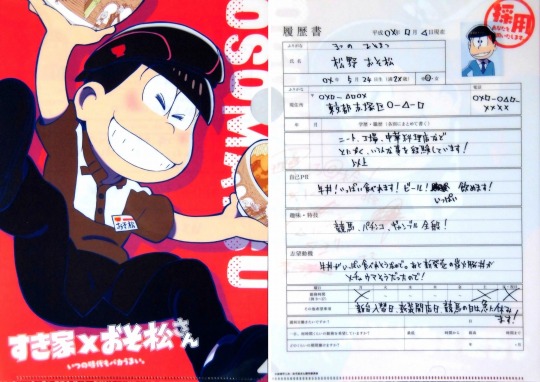
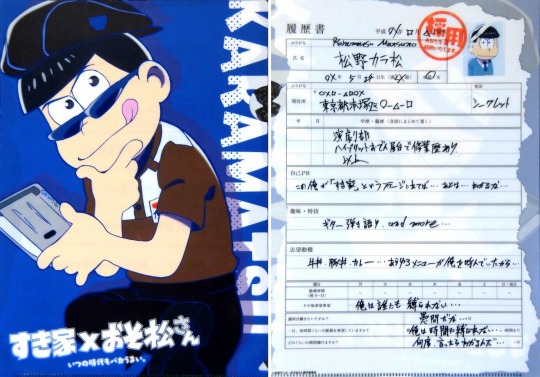
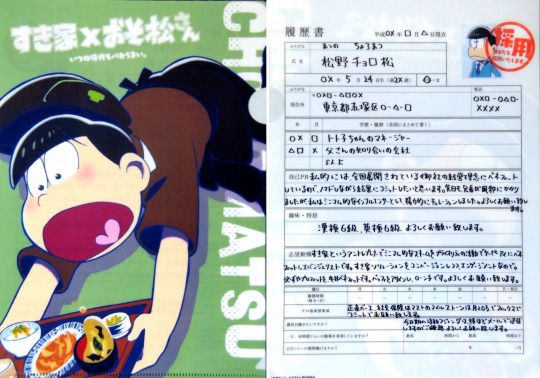
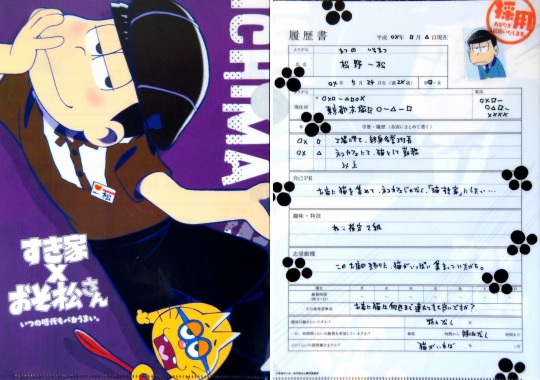
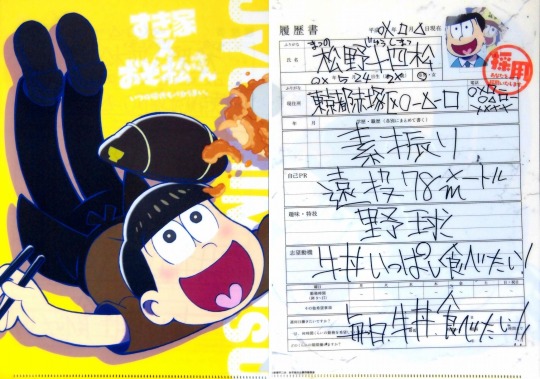
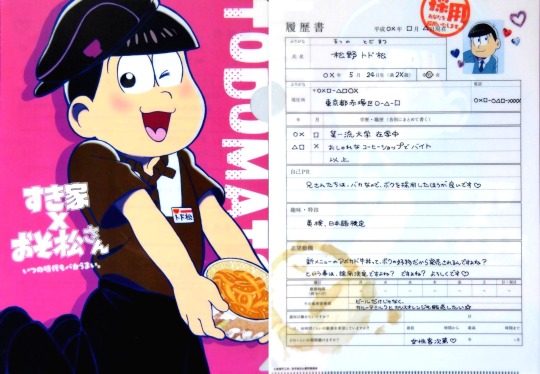
I found the full versions of the job apps from this post! This was a collab with the restaurant chain Sukiya, so that's where the job app is for! Pictures from this blog post here!
Translation under the cut
Osomatsu:
Academic background/work experience (include relevant experience):
(dates left blank) NEET, factory job, Chinese food restaurant, etc Anyway I have experience with a lotta stuff! And more
About yourself:
Gyuudon! I can eat a lot of it! Beer! (something crossed out) I can drink a lot of it!
Hobbies/Skills:
Horse racing, pachinko, all kinds of gambling!
Reason for your application:
Because I think I could eat a lot of gyuudon. And because I think a pork bowl made with a brand new model of charcoal grill would be tasty!
Working hours (for example 9 ~ 17): (he left this blank and just put an x through Monday, Saturday, and Sunday)
Other requests:
I’d like to immediately take off days where a machine is being replaced, store remodeling days, and horse race days!
What days would you prefer to work?: (left blank)
How many hours would you like to work a day?: (left blank) How long can you work for?: (left blank)
Karamatsu:
(in the furigana section where you're supposed to write the pronunciation of your name he wrote it in English instead of hiragana)
Phone Number: Secret (it's so important to tell you that he wrote "secret" as the English word in katakana, and not the Japanese word for secret)
Academic Background/Work Experience:
Theater Completed curriculum at Hybrid Oden cart (Hybrid misspelled as Hybrit) And more
About yourself:
When I take the stage called Sukiya... After that... Who knows...
(sorry if this is incorrect idk how the fuck to translate what he said. hate his ass /j)
Hobbies/Skills:
I can sing while playing guitar, and more...
Reason for your application:
Gyuudon, butadon, curry... Because your menu calls to me...
Working hours (for example 9 ~ 17): (left blank)
Other requests:
I'm not tied down to anyone...
What days would you prefer to work?:
What a foolish question...
How many hours would you like to work a day?:
I'm not tied down to any time...
How long can you work for?:
How many times do I have to tell you...
Choromatsu:
Academic Background/Work Experience:
Totoko-chan's manager Worked at father's friend's company And more
About yourself:
Personally, I would benefit from your company's management policy, so I think I can achieve results while working remotely. The other day, all my brothers caught a cold, but I was busy making content as a small influencer!*
Hobbies/Skills:
Kanji certification level 6, English certification level 6. Thank you very much.
Reason for your application:
Sukiya would benefit from an entrepreneur and marketing and advertising specialist with a concise plan to make KPIs a priority activity. Boosting conversions** can create solutions for Sukiya through engagement. Gyuudon benefits will surely create profit. Assign buffers and launch. Thank you very much.* ** like click through rate
Working hours (for example 9 ~ 17): (left blank)
Other requests:
Frankly, a pension plan is a must, with a minimum of 200,000 yen fixed and committed per month. Thank you very much.
What days would you prefer to work?:
I will send you the agenda for today's activities afterwards. Thank you very much.
How many hours would you like to work a day?: (left blank)
How long can you work for?: (left blank)
*(struggled so much with him and his business buzzwords if anyone has corrections please tell me)
Ichimatsu:
Academic Background/Work Experience:
Honored Squad Leader for Life at Factory Worked at Cat Cafe, as a cat And more
About yourself:
I want to gather some cats at the restaurant, but not like it would be a cat cafe, and make a "Cat Sukiya"...
Hobbies/Skills:
Cat certification level 2
Reason for your application:
I want to surround the restaurant with a lot of cats.
Working hours (for example 9 ~ 17): (left blank)
Other requests:
How many cats am I allowed to bring to the restaurant?
What days would you prefer to work?:
No particular preference
How many hours would you like to work a day?:
No particular preference
How long can you work for?:
As long as there's cats
Jyushimatsu:
Academic Background/Work Experience:
PRACTICE SWINGS
About yourself:
78 METER THROW
Hobbies/Skills:
BASEBALL
Reason for your application:
I WANT TO EAT LOTS OF GYUUDON!
(All the questions about when you're available to work):
I WANT TO EAT GYUUDON EVERY DAY!!
Todomatsu:
Academic Background/Work Experience:
Currently attending a very prestigious college Part time job at a trendy coffee shop And more
About yourself:
My brothers are all stupid, so I'm the best choice <3
Hobbies/Skills:
English and Japanese certified
Reason for your application:
The new menu item avocado gyuudon is my favorite, so you're going to release it, right? That is to say, you'll hire me, right? Right? Thanks <3
Working hours (for example 9 ~ 17): (left blank)
Other requests:
Rather than just beer, I want to sell kalua milk and cassis orange too ⭐
What days would you prefer to work?: (left blank)
How many hours would you like to work a day?: (left blank)
How long can you work for?:
Depends on if the customers are cute girls <3
thank you @totmatsu for ur help
#osomatsu san#mr osomatsu#osomatsu#osomatsu-san#ososan#osomatsu matsuno#karamatsu matsuno#choromatsu matsuno#ichimatsu matsuno#jyushimatsu matsuno#todomatsu matsuno#karamatsu#choromatsu#ichimatsu#jyushimatsu#todomatsu#translations
226 notes
·
View notes
Text

Du Wen at Her, the bar she started last year, in Shanghai. “I think everyone living in this city seems to have reached this stage that they want to explore more about the power of women,” she said.

Her is a self-described feminist bar in Shanghai where women gather to talk about their place in society

Tang Shuang at her bookstore, Paper Moon, in Shanghai

Wang Xia, left, and her Xin Chao Bookstore space in the Shanghai Book City in Shanghai

The female bookstore, Paper Moon, in Shanghai
In bars tucked away in alleys and at salons and bookstores around Shanghai, women are debating their place in a country where men make the laws.
Some wore wedding gowns to take public vows of commitment to themselves. Others gathered to watch films made by women about women. The bookish flocked to female bookshops to read titles like “The Woman Destroyed” and “Living a Feminist Life.”
Women in Shanghai, and some of China’s other biggest cities, are negotiating the fragile terms of public expression at a politically precarious moment. China’s ruling Communist Party has identified feminism as a threat to its authority. Female rights activists have been jailed. Concerns about harassment and violence against women are ignored or outright silenced.
China’s leader, Xi Jinping, has diminished the role of women at work and in public office. There are no female members of Mr. Xi’s inner circle or the Politburo, the executive policymaking body. He has invoked more traditional roles for women, as caretakers and mothers, in planning a new “childbearing culture” to address a shrinking population.
But groups of women around China are quietly reclaiming their own identities. Many are from a generation that grew up with more freedom than their mothers. Women in Shanghai, profoundly shaken by a two-month Covid lockdown in 2022, are being driven by a need to build community.
“I think everyone living in this city seems to have reached this stage that they want to explore more about the power of women,” said Du Wen, the founder of Her, a bar that hosts salon discussions.
Frustrated by the increasingly narrow understanding of women by the public, Nong He, a film and theater student, held a screening of three documentaries about women by female Chinese directors.
“I think we should have a broader space for women to create,” Ms. He said. “We hope to organize such an event to let people know what our life is like, what the life of other women is like, and with that understanding, we can connect and provide some help to each other.”
At quietly advertised events, women question misogynistic tropes in Chinese culture. “Why are lonely ghosts always female?” one woman recently asked, referring to Chinese literature’s depiction of homeless women after death. They share tips for beginners to feminism. Start with history, said Tang Shuang, the owner of Paper Moon, which sells books by female authors. “This is like the basement of the structure.”
There are few reliable statistics about gender violence and sexual harassment in China, but incidents of violence against women have occurred with greater frequency, according to researchers and social workers. Stories have circulated widely online of women being physically maimed or brutally murdered for trying to leave their husbands, or savagely beaten for resisting unwanted attention from men. The discovery of a woman who was chained inside a doorless shack in the eastern province of Jiangsu became one of the most debated topics online in years.
With each case, the reactions have been highly divisive. Many people denounced the attackers and called out sexism in society. Many others blamed the victims.
The way these discussions polarize society unnerved Ms. Tang, an entrepreneur and former deputy editor of Vogue China. Events in her own life unsettled her, too. As female friends shared feelings of shame and worthlessness for not getting married, Ms. Tang searched for a framework to articulate what she was feeling.
“Then I found out, you know, even myself, I don’t have very clear thoughts about these things,” she said. “People are eager to talk, but they don’t know what they are talking about.” Ms. Tang decided to open Paper Moon, a store for intellectually curious readers like herself.
The bookstore is divided into an academic section that features feminist history and social studies, as well as literature and poetry. There is an area for biographies. “You need to have some real stories to encourage women,” Ms. Tang said.
Anxiety about attracting the wrong kind of attention is always present.
When Ms. Tang opened her store, she placed a sign in the door describing it as a feminist bookstore that welcomed all genders, as well as pets. “But my friend warned me to take it out because, you know, I could cause trouble by using the word feminism.”
Wang Xia, the owner of Xin Chao Bookstore, has chosen to stay away from the “F” word altogether. Instead she described her bookstore as “woman-themed.” When she opened it in 2020, the store was a sprawling space with nooks to foster private conversations and six study rooms named after famous female authors like Simone de Beauvoir.
Xin Chao Bookstore served more than 50,000 people through events, workshops and online lectures, Ms. Wang said. It had more than 20,000 books about art, literature and self-improvement — books about women and books for women. The store became so prominent that state-owned media wrote about it and the Shanghai government posted the article on its website.
Still, Ms. Wang was careful to steer clear of making a political statement. “My ambition is not to develop feminism,” she said.
For Ms. Du, the Her founder, empowering women is at the heart of her motivation. She was jolted into action by the isolation of the pandemic: Shanghai ordered its residents to stay in their apartments under lockdown for two months, and her world narrowed to the walls of her apartment.
For years she dreamed of opening a place where she could elevate the voices of women, and now it seemed more urgent than ever. After the lockdown, she opened Her, a place where women could strike friendships and debate the social expectations that society had placed on them.
On International Women’s Day in March, Her held an event it called Marry Me, in which women took vows to themselves. The bar has also hosted a salon where women acted out the roles of mothers and daughters. Many younger women described a reluctance to be treated the way their mothers were treated and said they did not know how to talk to them, Ms. Du said.
The authorities have met with Ms. Du and indicated that as long as the events at Her didn’t become too popular, there was a place for it in Shanghai, she said.
But in China, there is always the possibility that officials will crack down. “They never tell you clearly what is forbidden,” Ms. Tang of Paper Moon said.
Ms. Wang recently moved Xin Chao Bookstore into Shanghai Book City, a famous store with large atriums and long columns of bookcases. A four-volume collection of Mr. Xi’s writings are prominently displayed in several languages.
Book City is huge. The space for Xin Chao Bookstore is not, Ms. Wang said, with several shelves inside and around a small room that may eventually hold about only 3,000 books.
“It’s a small cell of the city, a cultural cell,” Ms. Wang said.
Still, it stands out in China.
“Not every city has a woman’s bookstore,” she said. “There are many cities that do not have such cultural soil.””
324 notes
·
View notes
Text
From the December 3, 2024 story:
The upshot is that [Chinese crypto entrepreneur Justin] Sun just gave the Trumps a $16.5 million holiday bonus. Or, if you prefer, a $16.5 million bribe. Now, what might Sun be interested in here? ... Possibly this is some lobbying on behalf of the Chinese government, so as to influence the President-elect's thinking about tariffs. Or maybe, just maybe, Sun is worried about the fact that he's been charged with securities fraud by the SEC, and he could sure use a friend who could help him out with that. ... In any case, are we crazy in thinking that the incoming president taking what appears to be a $16.5 million bribe is a much bigger story than the outgoing president letting his kid off the hook?
53 notes
·
View notes
Text

Indulge in a flavor-packed journey with YOYO Chopsticks! Our noodles dance on your palate with every bite, while our crispy chilli potato adds the perfect kick to your meal. 🍜🔥 Whether you're a fan of classic dishes or looking to spice things up, we've got you covered. Join us at YOYO Chopsticks, your go-to Chinese fast food franchise, and experience the delicious fusion of flavors that keeps customers coming back for more!
#chinese food franchise#franchise#yoyo chopsticks#chopsticks#best chinese food franchise in india#entrepreneur#yoyo#cloud kitchen model#business#retail cafe model#chinese fast food franchise
0 notes